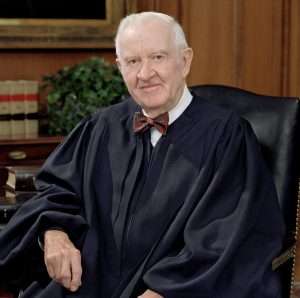
Retired Supreme Court Justice John Paul Stevens passed away tonight, at the age of 99. Stevens served on the Supreme Court for almost 35 years (1975-2010), one of the longest tenures in the Court’s history. Although a Republican appointee, he voted with the liberal wing of the Court on most contentious issues.
Stevens was notable for his independence and devotion to duty, both of which are amply evident in his fascinating recent memoir, The Making of a Justice: My First Ninety Four Years. I never had the privilege of meeting him myself. But I know a number of people who worked for him as law clerks. All speak of him with great admiration.
In his statement on Justice Stevens’ passing, Chief Justice John Roberts (who served with Stevens during the latter’s last five years on the Court) praised his colleague’s “inimitable blend of kindness, humility, wisdom, and independence.” Stevens was also one of the last prominent public servants from the generation that fought and won World War II, in which conflict he served in the Navy and won a Bronze Star.
Justice Stevens was not a prominent advocate of any particular theory of constitutional interpretation (like Justice Antonin Scalia with originalism); nor was he primarily known for shaping one or two specific areas of legal doctrine (like Justice Anthony Kennedy in the field of gay and lesbian rights). His legacy rests primarily on his numerous opinions across a wide range of issues. That makes it harder to assess, especially at a time when many of the issues he wrote opinions on are still highly controversial.
It will, therefore, probably be a long time before we reach any consensus on his place in legal history. For example, it is possible future generations will agree with him that the Court made a terrible mistake in recognizing an individual right to bear arms on the Second Amendment, which he considered the worst decision the justices made during his time on the Court. In that event, his dissent in District of Columbia v. Heller, might go down in history as one of the great opinions of its era. But it is also entirely possible that the verdict of history will go against him on this issue or that it will remain closely contested.
While I have great respect for Justice Stevens, I also believe that two of his majority opinions—Gonzales v. Raich and Kelo v. City of New London, were among the most problematic Supreme Court decisions of the last several decades. I hope both will someday be overruled. But I should add that Justice Stevens deserves great credit for admitting that his majority opinion in Kelo was based in part on a significant mistake (though he continued to believe he got the bottom-line result right). It is extremely rare for a Supreme Court justice—or any prominent jurist—to publicly recognize he made a serious error in one of his most famous opinions. Whether we agree with his views or not, we have much to learn from Justice Stevens’ honesty, integrity, and humility.
from Latest – Reason.com https://ift.tt/2LX4Spc
via IFTTT